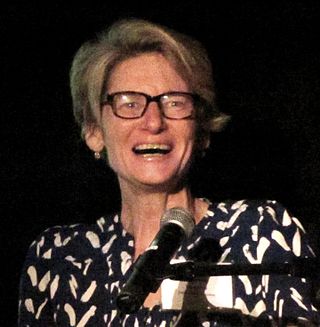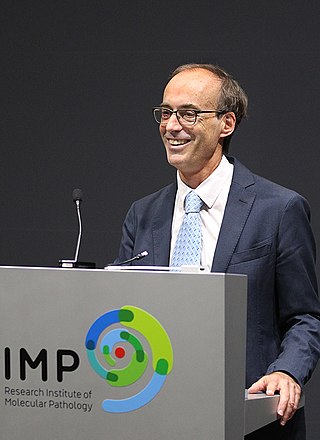Related Research Articles

Eugenie Carol Scott is an American physical anthropologist who has been active in opposing the teaching of young Earth creationism and intelligent design in schools. She coined the term "Gish gallop" to describe a fallacious rhetorical technique of overwhelming an interlocutor with as many individually weak arguments as possible, in order to prevent rebuttal of the whole argument.

Kenneth Raymond Miller is an American cell biologist, molecular biologist, and Professor Emeritus of Biology at Brown University. Miller's primary research focus is the structure and function of cell membranes, especially chloroplast thylakoid membranes. Miller is a co-author of a major introductory college and high school biology textbook published by Prentice Hall since 1990.

Bruce Michael Alberts is an American biochemist and the Emeritus Chancellor’s Leadership Chair in Biochemistry and Biophysics for Science and Education at the University of California, San Francisco. He has done important work studying the protein complexes which enable chromosome replication when living cells divide. He is known as an original author of the "canonical, influential, and best-selling scientific textbook" Molecular Biology of the Cell, and served as Editor-in-Chief of Science magazine. He was awarded the National Medal of Science for "intellectual leadership and experimental innovation in the field of DNA replication, and for unparalleled dedication to improving science education and promoting science-based public policy" in 2014.
The American Society for Cell Biology (ASCB) is a professional society that was founded in 1960.

Eva Nogales is a Spanish-American biophysicist at the Lawrence Berkeley National Laboratory and a professor at the University of California, Berkeley, where she served as head of the Division of Biochemistry, Biophysics and Structural Biology of the Department of Molecular and Cell Biology (2015–2020). She is a Howard Hughes Medical Institute investigator.

Daniel Edward Koshland Jr. was an American biochemist. He reorganized the study of biology at the University of California, Berkeley, and was the editor of the leading U.S. science journal, Science, from 1985 to 1995. He was a member of the United States National Academy of Sciences, the American Academy of Arts and Sciences, and the American Philosophical Society.

Elizabeth Marincola is the Senior Advisor for Communications and Advocacy at the African Academy of Sciences and is responsible for AAS Open Research, the Academy’s publishing platform. She has advocated for increased government resources dedicated to science and improved public education in science, and is an advocate of open access to the scientific literature, open scholarship and advancing research communication. Her 2013 TEDMED talk addresses many issues facing science, technology and medicine (STM) publishers, and she has advocated for quality research in Africa and why it is important. She also serves as an Ambassador for the European Science Foundation's Plan S.

Ronald David Vale ForMemRS is an American biochemist and cell biologist. He is a professor at the Department of Cellular and Molecular Pharmacology, University of California, San Francisco. His research is focused on motor proteins, particularly kinesin and dynein. He was awarded the Canada Gairdner International Award for Biomedical Research in 2019, the Shaw Prize in Life Science and Medicine in 2017 together with Ian Gibbons, and the Albert Lasker Award for Basic Medical Research in 2012 alongside Michael Sheetz and James Spudich. He is a fellow of the American Academy of Arts and Sciences and a member of the National Academy of Sciences. He was the president of the American Society for Cell Biology in 2012. He has also been an investigator at the Howard Hughes Medical Institute since 1995. In 2019, Vale was named executive director of the Janelia Research Campus and a vice president of HHMI; his appointment began in early 2020.

The San Francisco Declaration on Research Assessment (DORA) is a statement that denounces the practice of correlating the journal impact factor to the merits of a specific scientist's contributions. Also according to this statement, this practice creates biases and inaccuracies when appraising scientific research. It also states that the impact factor is not to be used as a substitute "measure of the quality of individual research articles, or in hiring, promotion, or funding decisions".

Lynne Elizabeth Maquat is an American biochemist and molecular biologist whose research focuses on the cellular mechanisms of human disease. She is known for her work in describing the process of nonsense-mediated decay. She is an elected member of the American Academy of Arts and Sciences, the National Academy of Sciences and the National Academy of Medicine. She currently holds the J. Lowell Orbison Endowed Chair and is a professor of biochemistry and biophysics, pediatrics and oncology at the University of Rochester Medical Center.
Zena Werb was a professor and the Vice Chair of Anatomy at the University of California, San Francisco. She was also the co-leader of the Cancer, Immunity, and Microenvironment Program at the Hellen Diller Family Comprehensive Cancer Center and a member of the Executive Committee of the Sabre-Sandler Asthma Basic Research Center at UCSF. Her research focused on features of the microenvironment surrounding cells, with particular interest in the extracellular matrix and the role of its protease enzymes in cell signaling.
Jessica Polka is a biochemist and the Executive Director of ASAPbio, a non-profit initiative promoting innovation and transparency via preprints and open peer review. She was one of the organizers of a recent meeting they held on scholarly communication.
JoAnn Trejo is an American pharmacologist, cell biologist, a professor, and also an assistant vice chancellor in the department of health sciences faculty affairs in the Department of Pharmacology at the School of Medicine at University of California, San Diego. She is also the assistant vice chancellor for Health Sciences Faculty Affairs. Trejo studies cell signalling by protease-activated G protein-coupled receptors (GPCRs). She is also actively involved in mentoring, education and outreach activities to increase the diversity of science.
Steven Arthur Farber is an American scientist. He is a Professor of Biology at Johns Hopkins University.
Steven J. Fliesler is a distinguished American biochemist and researcher renowned for his contributions to the field of ophthalmology. He currently holds the title of SUNY Distinguished Professor and serves as the Meyer H. Riwchun Endowed Chair Professor of Ophthalmology at the University at Buffalo, The State University of New York (SUNY). Additionally, he also serves as the Vice-Chair for Research in the Department of Ophthalmology and acts as the Director of the Ira G. Ross Eye Institute Vision Research Center at the Buffalo VA Medical Center, VA Western NY Healthcare System (VAWNYHS), in Buffalo, NY.
Suzanne Eaton was an American scientist and professor of molecular biology at the Max Planck Institute of Molecular Cell Biology and Genetics in Dresden, Germany.
Andrew Garrett Campbell is an American biologist who is a professor of Medical Science and Dean of the Graduate School at Brown University. In 2020 he was named by Cell Press as one of the most 100 "inspiring Black scientists in America".
Kathleen J. Green is a cell biologist whose research focuses on how cell-cell communication drives tissue form and function. She is the Joseph L. Mayberry Professor of Pathology and Toxicology and Professor of Dermatology at Northwestern University Feinberg School of Medicine in Chicago. She also serves as Associate Director of Basic Sciences at the Robert H. Lurie Comprehensive Cancer Center of Northwestern University.
Erin Dolan is the Georgia Athletic Association Professor of Innovative Science Education at the University of Georgia. Dolan is a biochemist known for her research on engaging students in science research.
References
- ↑ "Bruce Alberts Award for Excellence in Science Education". ASCB. Retrieved 2015-12-13.
- ↑ "Zebrafish outreach program nets organizers 2020 Bruce Alberts Award for Excellence in Science Education". ASCB. 17 September 2020. Retrieved 22 July 2021.
- ↑ "Biology Education Researcher Named 2019 Bruce Alberts Award Winner". www.newswise.com. Retrieved July 22, 2021.
- ↑ "Dolan Wins 2018 Bruce Alberts Award for Excellence in Science Education". ASCB. 21 August 2018. Retrieved July 22, 2021.
- ↑ "Harmon Hines named recipient of Bruce Alberts Award for Excellence in Science Education". University of Massachusetts Medical School. Retrieved 2015-12-13.
- ↑ "HU Professor receives National Science education award : Hampton University News". news.hamptonu.edu. Retrieved 2015-12-13.
- ↑ "Science education award". UDaily. Retrieved 2015-12-13.